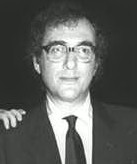
'I spat out Plath and Pinter' - Faster

'I spat out Plath and Pinter' - Faster
HAROLD PINTER
A powerfully hypnotic postmodern playwright, Harold Pinter created complex and challenging works. Writing for the stage, motion pictures, and television, Pinter reached a wide audience. His plays often placed few characters in closed-in settings, pitching their minds into each other with their conflicting versions of reality and the past.
Pinter was born in London's East End on Oct. 10, 1930. He studied acting at the Royal Academy of Dramatic Art for a short time and later acted in several repertory companies using the stage name David Baron. He declared himself a conscientious objector to military service and was eventually tried and fined. Pinter continued to act occasionally, using his own name, and also directed both his own works and those of other writers.
Pinter's plays are characterized by ambiguity and stark dialogue. Silences and pauses are in all of his works and often lead an audience to sense some undefinable terror. Writing with a dry English humor, Pinter blurs the lines between truth and falsehood, reality and fantasy.
Pinter wrote both one-act and full-length plays, several of which he later made into films. His first plays, 'The Room' and 'The Dumb Waiter', were written in 1957. Others include 'The Birthday Party' (1958, film 1968), 'The Caretaker' (1960), 'The Homecoming' (1965, film 1973), 'Old Times' (1971), 'No Man's Land' (1975), and 'Betrayal' (1978, film 1983). His works for television and radio include 'A Night Out' (1960), 'The Collection' (1961), and 'Tea Party' (1964).
Besides writing screenplays and directing his own works, Pinter also directed works by other writers and wrotem screenplays from other novels. In 1970 he directed James Joyce's 'Exiles', and his screenplay for John Fowles's 'The French Lieutenant's Woman' in 1981 was widely acclaimed. Other screenplays include 'Accident' (1967) and 'Turtle Diary' (1985)